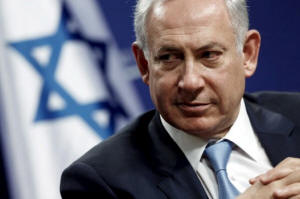|
U.S. intended to allow passage of U.N.
draft critical of Israel: officials
 Send a link to a friend
Send a link to a friend
 [December 23, 2016]
UNITED NATIONS/WASHINGTON (Reuters)
- The United States intended to allow the U.N. Security Council to
approve a resolution demanding an end to Israeli settlement building,
two Western officials said on Thursday, a major reversal of U.S.
practice, which prompted Israel to ask President-elect Donald Trump to
apply pressure. [December 23, 2016]
UNITED NATIONS/WASHINGTON (Reuters)
- The United States intended to allow the U.N. Security Council to
approve a resolution demanding an end to Israeli settlement building,
two Western officials said on Thursday, a major reversal of U.S.
practice, which prompted Israel to ask President-elect Donald Trump to
apply pressure.
In a day of intense diplomatic wrangling on one of the thorniest Middle
East conflicts, Egypt, which had proposed the draft resolution, abruptly
put off a vote that had been scheduled for Thursday afternoon. Diplomats
said Cairo had acted under pressure from Israel and to avoid alienating
Trump, who spoke to the Egyptian president and urged the White House to
use its veto.
By late Thursday, four Security Council members had given Egypt an
ultimatum and threatened to put the draft resolution to a vote.
The two Western officials said President Barack Obama had intended to
abstain from the vote, a relatively rare step by the United States to
register criticism of the building on occupied land that Palestinians
want for a state.
The government of Israeli Prime Minister Benjamin Netanyahu, who has had
an acrimonious relationship with Obama, believes the Obama
administration had long planned the council vote in coordination with
the Palestinians, the senior Israeli official said.
"It was a violation of a core commitment to protect Israel at the U.N.,"
the official said.

The White House had no immediate comment.
U.S. officials have voiced growing fears that a "two-state" solution is
imperiled by Israeli settlement building and have been more willing to
voice open criticism, including, the two Western officials said, via
Thursday's planned vote.
A U.S. abstention would have been seen as a parting shot by Obama, who
has made the settlements a major target of his - ultimately futile -
peace efforts.
President Abdel Fattah al-Sisi of Egypt, which in 1979 became the first
Arab nation to make peace with Israel, called Trump on Thursday, a Trump
transition official said, saying they spoke broadly about laying the
ground for Middle East peace.
Sisi's office said the two leaders spoke.
"The presidents agreed on the importance of affording the new U.S.
administration the full chance to deal with all dimensions of the
Palestinian case with a view of achieving a full and final settlement,"
presidency spokesman Alaa Yousef said.
The resolution would demand Israel "immediately and completely cease all
settlement activities in the occupied Palestinian territory, including
East Jerusalem" and said the establishment of settlements by Israel has
"no legal validity and constitutes a flagrant violation under
international law."
Egypt, currently a Security Council member, worked with the Palestinians
to draft the text.
The senior Israeli official said Israel remained concerned the
resolution could still go ahead with another sponsoring country.
New Zealand, Venezuela, Malaysia and Senegal asked Egypt to clarify by
midnight whether it planned to call a vote.
"In the event that Egypt decides that it cannot proceed to call for vote
on 23 December or does not provide a response by the deadline, those
delegations reserve the right to table the draft ... and proceed to put
it to vote ASAP," the four states wrote in a note, seen by Reuters.
They said "the proposal for other delegations to take the lead ... would
also help Egypt by relieving it of the burden of carrying this draft
alone." They plan to meet on Friday morning to decide how to proceed,
diplomats said.
[to top of second column] |

Israel's Prime Minister Benjamin Netanyahu participates in a forum
hosted by the Center for American Progress in Washington November
10, 2015. REUTERS/Jonathan Ernst/File Photo

CONSTRUCTIVE RELATIONS WITH TRUMP?
Officials in Netanyahu's office spoke to Egyptian officials on
Thursday about postponing the vote, an Israeli diplomat said.
It was not clear what pressure Israel may have put on Egypt but
there are several ways it could do so, including curtailing Israeli
security cooperation in Egypt's fight against Islamist militants in
the Sinai desert.
Netanyahu took to Twitter in the dead of night in Israel to make the
appeal for a veto.
Hours later, Trump backed fellow conservative Netanyahu on one of
the most contentious issues in the Israeli-Palestinian conflict and
the pursuit, effectively stalled since 2014, of a two-state
solution.
The State Department declined to comment immediately on reports of
the planned abstention.
Israel's far-right and settler leaders have been buoyed by the
election of Trump, who has signaled a possible change in U.S. policy
by tapping a fundraiser for a major Israeli settlement as
Washington's ambassador to Israel.
Netanyahu, for whom settlers are a key constituency, has said his
government has been their greatest ally since the capture of the
West Bank and East Jerusalem in a 1967 war.
The United States says continued Israeli settlement building lacks
legitimacy, but has stopped short of adopting the position of many
countries that it is illegal under international law. Some 570,000
Israelis live in the West Bank and East Jerusalem.
A resolution needs nine votes in favor and no vetoes by the United
States, France, Russia, Britain or China to be adopted.
The United States has vetoed dozens of Security Council resolutions
on Israel and it is rare for it to abstain.
The last time the Security Council adopted a resolution on Israel
and the Palestinians was in January 2009, when Washington abstained
on a resolution calling for ceasefire and withdrawal of Israeli
forces from Gaza.

In 1979 the United States abstained on a resolution, when the
council said Israeli settlements “have no legal validity and
constitute a serious obstruction to achieving a comprehensive, just
and lasting peace in the Middle East.” Britain also abstained.
(Additional reporting by Yara Bayoumy, Susan Heavey, Arshad
Mohammed, Matt Spetalnick, Emily Stephenson and Lesley Wroughton in
Washington, John Irish traveling with the French foreign minister,
Jeffrey Heller and Ori Lewis in Jerusalem, and Amina Ismail and
Ahmed Aboulenein in Cairo; Writing by Arshad Mohammed; Editing by
James Dalgleish and Leslie Adler)
[© 2016 Thomson Reuters. All rights
reserved.]
Copyright 2016 Reuters. All rights reserved. This material may not be published,
broadcast, rewritten or redistributed. |